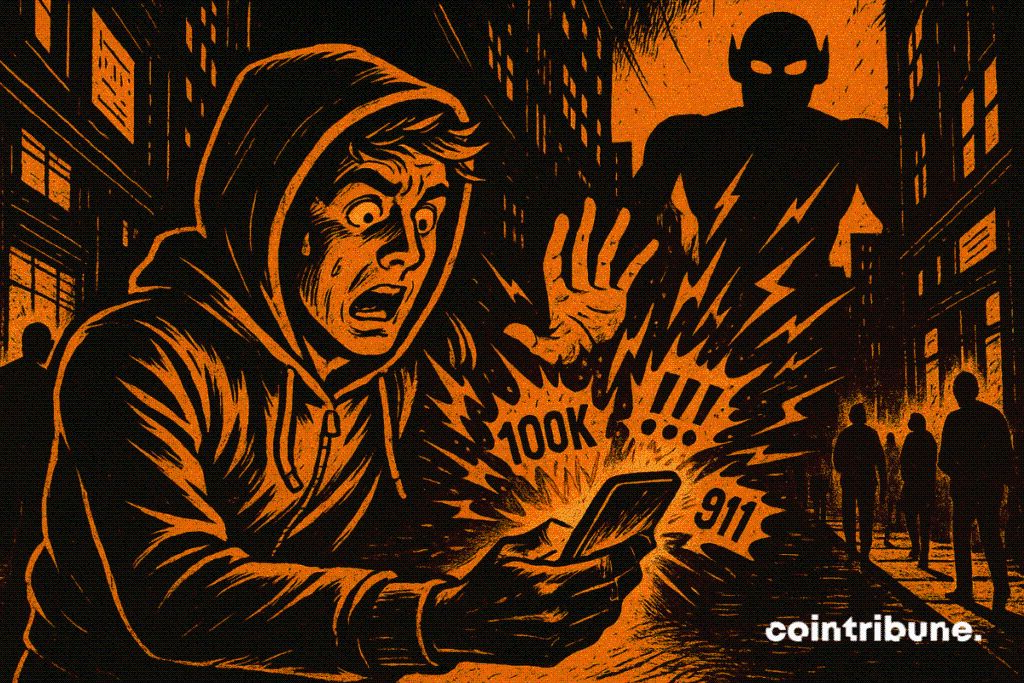In the wake of the assassination of Charlie Kirk, we are going to see a lot of accounts pushing, effectively, for civil war in the US. This includes the rage-baiter in chief, Elon Musk, but also an army of Russian and Chinese bots and their faithful shills in the West.
— Branislav Slantchev (@slantchev) September 10, 2025
Do not… https://t.co/OyErwAYnV8
Manipulation Fears Rise As Bots Swarm Social Media
By: Cointribune
Less than twenty-four hours after the assassination of Charlie Kirk in Utah, the social network X was overwhelmed with messages calling for revenge and mentioning a civil war. Thousands of posts, often written in identical terms, point to the left as responsible. Faced with this surge, several researchers suspect artificial amplification. Behind these calls for violence, some accounts show characteristics of automated networks.

In brief
- The assassination of Charlie Kirk triggered a wave of messages calling for civil war on the X platform (formerly Twitter).
- Many accounts with suspicious profiles spread identical messages, fueling suspicions of a coordinated campaign.
- Researchers note characteristic signs of bot networks: AI-generated photos, generic bios, low previous activity.
- No formal evidence of a coordinated operation has been established to date, but worrying precedents exist.
Calls for civil war from the first hours
Hours after the announcement of the assassination of Charlie Kirk, which occurred during an event in Salt Lake City (Utah), the X platform (ex-Twitter) was flooded with hostile messages calling for civil war or reprisals against the American left, while the EU is preparing significant sanctions against the said social network .
These posts, often repeated word for word, quickly drew attention due to their belligerent tone and rapid spread. Phrases such as “This is war”, “The left will pay for this” or “You have no idea what’s coming” were repeated many times, coming from accounts with very similar and unengaging profiles.
Political scientist Branislav Slantchev, professor at the University of San Diego, summarized the situation on X as follows: “we are going to see many accounts actually pushing toward a civil war in the United States. This includes the master provocateur, Elon Musk, but also an army of Russian and Chinese bots, as well as their zealous relays in the West”.
What many users and researchers have noted is the strong concentration of profiles meeting recurring criteria, suggesting algorithmic or automated amplification of content :
- Profile pictures generated by AI or borrowed from image banks ;
- Generic biographies, often limited to a few keywords (Christian, MAGA, Patriot, etc.) ;
- Systematic mentions like “NO DMs” present on many accounts involved in this spread ;
- Patriotic banners and visuals, American flags or quotes from conservative figures ;
- Very low activity history, outside publications related to this event ;
- Very tight posting timing, with similar messages posted several times.
These elements, taken separately, do not constitute formal proof of automation. However, their accumulation and homogeneity have fueled suspicions of a disinformation or orchestrated amplification operation on X, exploiting the shock caused by Kirk’s assassination.
Suspicions of algorithmic manipulation without formal proof
While signals of a possible orchestrated manipulation are numerous, no public authority, cybersecurity center, or even major platforms have to date confirmed the existence of a coordinated bot campaign related to this event.
However, several studies recall that foreign operations amplifying polarizing discourse, such as “Spamouflage” (network attributed to China) or “Doppelgänger” (pro-Russian influence campaign), have already targeted the United States via networks of fake accounts and AI-generated content.
In 2024, a Global Witness investigation had identified 45 accounts with an ordinary appearance, which alone generated more than 4 billion impressions around polarizing content.
The rapid evolution of technologies related to artificial intelligence now makes these campaigns harder to detect. Publications with human tones, impeccable spelling, and posted at credible times can now be produced on an industrial scale.
A study published in Plos One last February indicates moreover that since the purchase of X by Elon Musk, the volume of hateful speech has increased, without the proportion of inauthentic accounts decreasing.
While the UN increasingly warns against deepfakes, the scale and virulence of this new wave of calls for civil war on X may only be the first signs of a larger battle, fought through algorithms and servers. If the thesis of foreign interference remains to be confirmed, it highlights a fundamental truth: modern political chaos no longer only breaks out at the polls or in the streets, but also, and perhaps especially, behind the scenes of code.
Disclaimer: The content of this article solely reflects the author's opinion and does not represent the platform in any capacity. This article is not intended to serve as a reference for making investment decisions.
Lock now!
You may also like
Crypto prices
MoreBecome a trader now?A welcome pack worth 6200 USDT for new users!
Sign up now